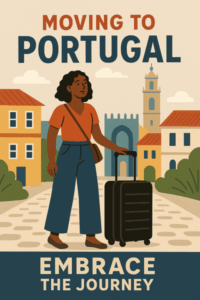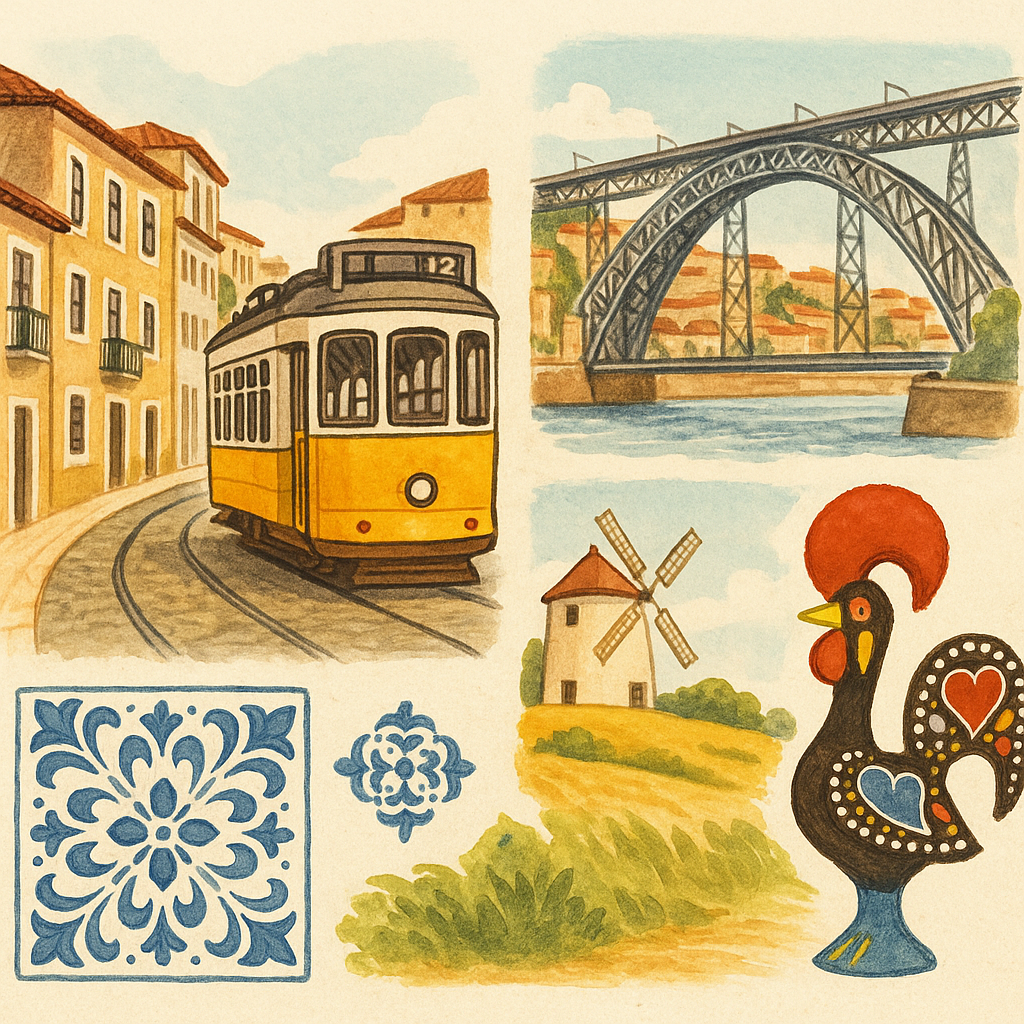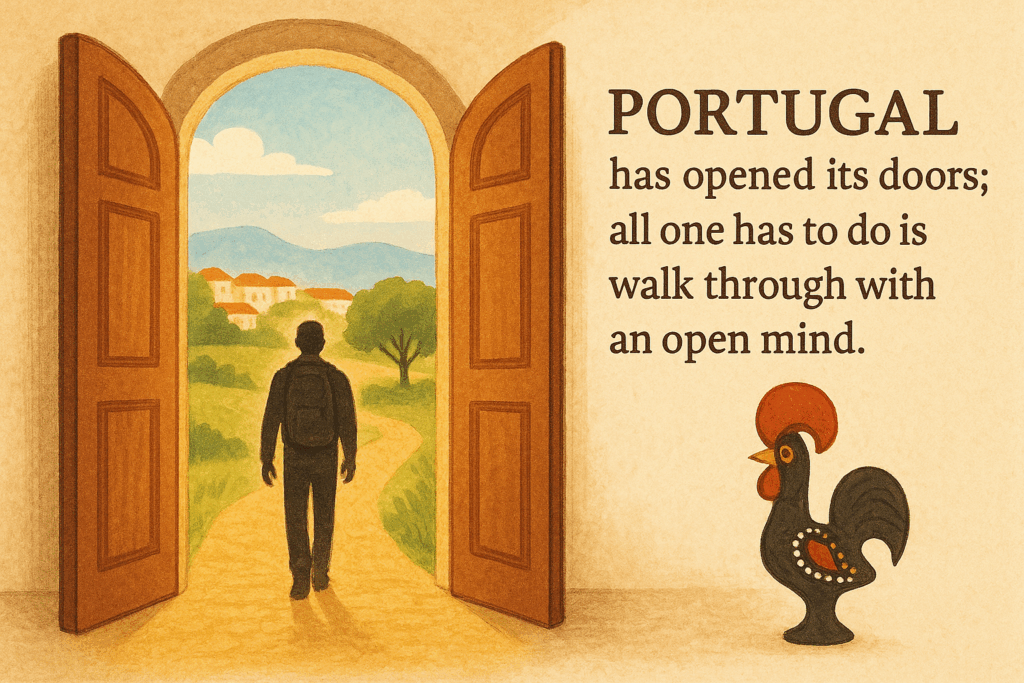
I did not have any expectations moving to Portugal. I knew it would be an adventure absorbing a new country’s culture, existing without a car, and building new friendships.
Nonetheless, when one decides to uproot to a foreign country, either for work, retirement easiness, or to reconnect with family… nothing is easy, but learning the ropes is not impossible. Connecting with groups like InterNations, Friends in Portugal, and Blacks in Portugal helped with the transition. Honestly, there are many groups and associations to help answer all those questions hitting you the day you realize you bought a one-way ticket and sold all your belongings in the U.S.
I tell anyone who asks what I did. Well, I took a deep breath for one and embraced the journey I had embarked on without knowing the language or a single person, except for my real estate agent, Sybille, who spoke French and broken English.
There are two parts to this message. The first one I call: What to know AFTER you unpack you bags and realize where you are (or aren’t).
One thing I believe to be the most honest advice I was given was from my real estate agent: “It will take a minimum two years to get used to, at least one-half of living in Portugal. It will take time.” Crossing the ocean isn’t for the faint of heart! Setting up a bank account, getting your Visa, finding a place to live, establishing your utilities/internet, and, here’s the fun part: dealing with Customer Service, Merchants, and City Officials who don’t speak English (or very little)!
How well Sybille’s words have resonated with me. This is my second year of being more or less full-time, unlike in 2019, when purchasing an apartment meant I only had brief sprints of enjoyment.
Making the move to live here more than not has been a stretch of will power, and also an amazing adventure, one that’s opened my eyes to Americans who moved here, meeting people from around the world, traveling to some of the cities on my bucket list, and tasting cuisines I never thought I’d have the chance to try. Authentic food from Spain, Italy, France, the Netherlands, Prague, and Portugal will quickly tell you that life is okay without KFC, McDonald’s, Burger King, or Starbucks.

I want to share some basics for anyone who is reading those enticing International Living articles and believing Portugal is the place for them. Here are a few points to consider: The Cost of Living in some of the favorite places Americans gravitate to relocate (FYI: Oporto is Porto) in Portugal:
- Cost of living in Lisbon is 32% more expensive than in Santiago, Chile
- Cost of living in Aveiro is 50% cheaper than in Denver, Colorado
- Cost of living in Lisbon is 5% cheaper than in Madrid
- Cost of living in Coimbra is 32% more expensive than in Tucumán
- Cost of living in Lisbon is 20% more expensive than in Tijuana
- Cost of living in Lisbon is about the same as in Valencia, Spain
- Cost of living in Lisbon is 56% cheaper than in London
- Cost of living in Funchal, Madeira is 4% more expensive than in Ponta Delgada, Azores
- Cost of living in Lisbon is 32% more expensive than in São Paulo
- Cost of living in Lisbon is 37% cheaper than in Paris
- Cost of living in Oporto is 44% more expensive than in Reynosa
- Cost of living in Lisbon is 52% more expensive than in Rio de Janeiro
- Cost of living in Oporto is 16% cheaper than in Madrid
- Cost of living in Lisbon is 14% cheaper than in Aalborg
- Cost of living in Lisbon is 32% cheaper than in Tel Aviv
- Cost of living in Oporto is 69% more expensive than in Rousse
- Cost of living in Evora is 15% cheaper than in Lisbon
- Cost of living in Oporto is 48% cheaper than in San Jose, California
- Cost of living in Lisbon is 7% cheaper than in Nuremberg
- Cost of living in Lisbon is 21% cheaper than in Las Vegas, Nevada
Language is a barrier. Learning it is a must to maneuver comfortably. That said, English is widely spoken in cities like Porto and Lisbon. *I’ve enrolled in a year’s course of A1 and A2 Portuguese, starting in September.
Another thing I want to share:
Portugal ranks 5th globally for healthcare access, public safety, and work-life balance. For people of color, like me, this often translates into feeling physically safer and more mentally stable than in countries where systemic racism is more deeply entrenched.
Public healthcare is accessible to residents (including Visa holders), and many urban centers offer services in English. While learning Portuguese is encouraged, Lisbon and Porto are very accommodating to English speakers.
Portugal’s weather is similar to Seattle, but Southern Portugal is similar to San Diego.

Friendliness and acceptance to non-arrogant foreigners is an open door. However, don’t expect restaurants to be open before 7 p.m. Many businesses are closed for two hours ranging from 1 p.m. to 3 p.m. in the afternoon. Sunday is a holiday, and churches are attended; merchants, especially in smaller towns, are closed. Tipping is as little as 5%, which is relatively cheap considering the cost of a meal. So, a 2–3 euro tip is the norm. I’ve never paid more than 5 euros. Food is organic, fish is fresh, and the cost of groceries for two people is about the cost for one person at many of the large American food chains. Frankly, I go to the local Farmer’s Market and have a field day. Uber won’t break your bank account, and a major important point is the metro train is clean, clean, clean and safe (no pickpockets), and a schedule—running up until midnight—you can count on.
Portugal has opened its doors; all one has to do is walk through with an open mind.
My next blog will be covering how black people are treated in Portugal and why they are going to Portugal and to other European countries. Some of the reasons and answers will surprise you.

Thanks for sharing your adventure. My wife is from Bogota, Colombia, and, while we don’t live there, I understand the difficulties of adapting to a new culture, way of life, and infrastructures. Good luck with your language classes. Take care.
Hi Chris, thank you for your comment. I will also say, it’s insightful what this journey has been so far, and what remains to be a discovery. Once an American throws out the window, they are NOT SPECIAL, and remember they ARE the foreigner, the unfolding days wont be as daunting. It was a choice to move here, not an invitation, so with that, I knew I would have to adapt and not the other way around. My next blog will be prove to just as interesting.
Thanks, I really enjoy hearing about what it’s like living in Portugal. I would to know to hear about the local IT industry.
Robert, I think you would like Europe as a place to learn and experience other cultures. Lisbon and Braga are HUGE IT markets for nomad visas (meaning you an work remotely). These are worth researching.
Hello, Cheryl: What an informative blog post. So happy to hear you are assessing your decisions (with Tom) to make Portugal your home and HOW IMPORTANT it is to learn the language. So glad you’re going to tackle that “must” soon. Look forward to your thoughts on how Blacks are treated in Portugal (and the surprise therein). We miss you both and hope one day to visit you in your new home/country. Big hugs! Donna
Donna, as you know, from living in Europe, the faint of heart isn’t just leaning a different language, it’s moving about each day, adjusting to what you DIDN’T know from all previous research. I do find my patience tested, but one thing I’ve realized, this was a self-inflicted decision to leave all familiar surroundings—NOT an extended invitation from a country unaware of my intentions. It’s now a realization after all this time, HOME is here, more than not. Happiness is here, more than not, and embracing Europe is what comes easier than I imagined.
Cheryl, Enjoyed your positive descriptions of Portugal’s open doors. Sounds as if you’re settling in and discovering periods of heart contentment. I agree with Sybille, your estate agent, my experience in moving, especially from one country to another, or even between States in the US, takes some two years. Knowing this has helped me be kind to myself in the process, though other new experiences appear afterward, over time. Keeps life stimulated! Ever considered submitting your writing to a travel magazine or newspaper travel section? Much love to you, dear one, and Tom.
P.S. I guess sometime one of your gastronomic experiences will be Greek.
Zoe, I always enjoy reading your comments on my blog through these years. It’s ironic that we first met in Hawaii. There’s a genuine feeling moving to another country has for one’s spirit. In spite of the ups and downs with government red tape, I’m still standing. A decision to change my life in its second act, has been a rewarding and challenging. But you know, I’m better for it. The world has opened my eyes to many colors I only dreamed of. Yes, one day, I’ll see you in Greece!
Thanks for the informative post! I look forward to reading the next one.
Thanks Faustina, at this point in my life, I’m open to new adventures and even challenges.
Cheryl, meeting you and Tom is certainly one of the best things about my move to Portugal. I am grateful for your positivity and can-do approach to this adventure living abroad. Boa sorte with your Portuguese class!
Eliza, our paths have crossed in the past, as we’ve spoke about. I’m grateful for your friendship and my voice of reason when I think things are difficult in this foreign country. We are kindred spirits, and more than that, sisters who share many ideals and dreams.